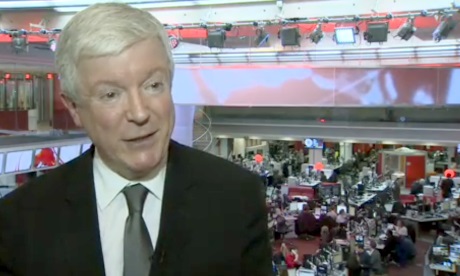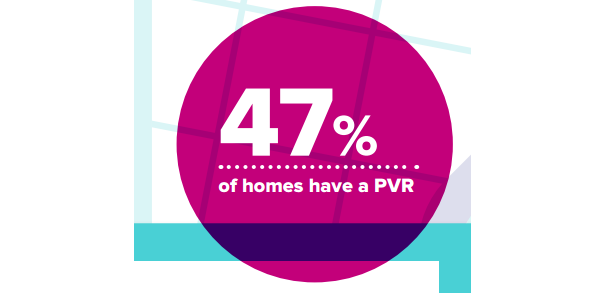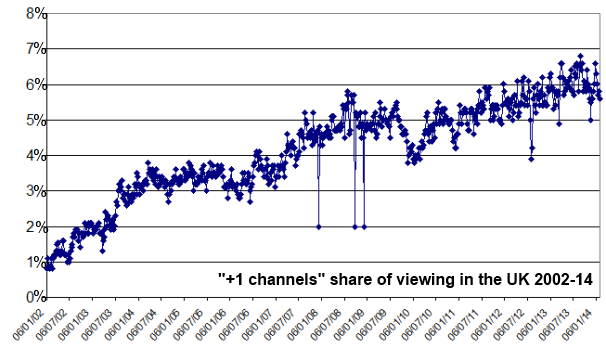BBC three to be taken online and replaced on Freeview and satellite with BBC 1+1

Here's Tony Hall's speech:
“Since I came back to the BBC I hope I've made two things clear.
“First that the BBC is living with a licence fee that for five years will have been flat - it will not have gone up at all. And, at the same time, we are absorbing extra costs that we were asked to take on - for the World Service, S4C and the roll-out of broadband. That's why the organisation has had to look for savings - so that we, like everyone else in these difficult economic times, can live within our means. My concern - along with that of everybody I meet inside and outside the BBC - is to ensure that the quality of what we do is not compromised along the way. We are here to produce exceptional and distinctive programmes and services for Britain and the world. But I do believe, as I said only last week, that the BBC has taken incremental change as far as it can. Something has to give. And that means hard choices. But there is one choice I will never make - and that's to sacrifice quality. And I believe that's what the British public thinks too.
“The second point I've made is that the BBC is, by its nature and history, an organisation that constantly reinvents itself, an organisation that takes the idea of public service broadcasting - to inform, educate and entertain - and makes it relevant for each generation in our nearly one hundred year history. I remember myself the launch of BBC News Online when I was running BBC News. There was a great deal of scepticism to put it mildly. But we were doing what the BBC and its staff have always done - using our innate creativity to lead the way. That's why now - for this generation - I believe the iPlayer is a key part of the future for public service broadcasting. It's the gateway for people who increasingly want to watch and listen to what they want, when they want it - on tablets, on mobiles as well as other screens. I am sure that this is going to be increasingly important for our younger audiences. And reaching those audiences is vital for the BBC.
“Reconciling these two aims - financial and strategic - has led us to this difficult conclusion. We should close BBC Three as a broadcast or linear channel and ask Danny and his team to reinvent it as a channel online and on the iPlayer. We propose making this change in the autumn of next year. I believe it’s the right thing to do: young audiences – the BBC Three audience – are the most mobile and ready to move to an online world. 25% of viewing by 16-24 year olds is to catch-up or other screens and over the next few years we expect that to reach 40%. We recognise that, for now, most of this audience still do their viewing on television, and that is why we plan to show BBC Three’s long-form content on either BBC One or BBC Two.
“I’m convinced that the BBC as a creative organisation will be able to reinvent a space for young people on the iPlayer that will be bold, innovative and distinctive. It will not just be a TV channel distributed online - it will be an opportunity to look at new forms, formats, different durations, and more individualised and interactive content. It will play to BBC Three’s strengths, offer something distinctive and new, and enhance the BBC’s reputation with young audiences. And I will challenge everyone in the BBC to spend much more time focusing on programming for young audiences. We will lead the way.
“Let me just say to Zai and the BBC Three team: you produce, and will continue to produce, amazing programmes – bringing new ideas, new stories and new talent to our screens. BBC Three has an extraordinary track record – it’s been home to Gavin & Stacey, Little Britain, Bad Education and, right now, Bluestone 42. I’ve also been seriously impressed by the current affairs I’ve seen – from Blood, Sweat and T-Shirts and Our War, to Reggie Yates’s outstanding reports from South Africa, ending just this week. You can be rightly proud of what you have achieved so far. I want you to carry on making programmes for young audiences that continue to break new ground.
“This is the first time in the BBC's history that we are proposing to close a television channel. I can’t rule out it being the last change to our programmes or services. It will save the BBC over £50 million a year. £30 million of that will go into drama on BBC One. And it also means we will extend Children's programmes by an hour a night and provide a BBC One +1 channel. I must stress - all of this is what we are proposing to the BBC Trust. They will have the final say.
“I am certain that this decision is strategically right - but it's also financially necessary too. Delivering the savings programme following the last licence fee negotiation means these changes are happening earlier than they might in a better financial environment. And I don’t simply want to keep salami slicing the budgets in a way that means our frontline staff are always asked to keep doing more with less. I am sure that we will have to face up to further difficult challenges as we build the BBC for the future. But in making those changes, I am determined to ensure we embrace the new opportunities technology gives us - and match that with programming of the highest quality that is simply the best in the world.â€
Danny Cohen, Director of BBC Television, said:
"This is the biggest strategic decision the BBC has made in over a decade. While it has been an extremely difficult decision borne out of financial necessity, I believe it is also a creatively energising and innovative move. In autumn 2015 we plan to close BBC Three as a linear TV Channel and in its place we will develop a bold, ambitious, future-facing new version of BBC Three online. I think this can be transformational for both the BBC’s relationship with young audiences and the BBC’s approach to the digital age overall. When we take BBC Three online we need to see it as a brand new Service launch. It is an opportunity for both radical thinking and unprecedented collaboration both inside the BBC and with our audiences and creative partners outside the corporation.
“The new version of BBC Three online will continue to have the things we all cherish most about the Service – innovative comedy, unrivalled Current Affairs for young people, incisive and entertaining factual, and original entertainment. I want and expect us to keep making shows for young audiences of the quality of 'Our War' and the public service value of BBC Three’s recent season on young people and mental health. BBC Three will continue to build on the comic brilliance of 'Little Britain', 'Gavin and Stacey' and 'Bad Education', of the entertainment value of 'Russell Howard’s Good News' and 'Backchat'. And BBC Three will continue to commission Current Affairs of the pedigree of recent documentaries on Afghanistan, the Congo, India, South Africa and of course the tough challenges faced by young people here in the UK. What is changing is the way we deliver these programmes to our audiences.
“BBC Three will continue to do all the things we love but it will also have the freedom to break traditional shackles and allow the BBC to be a leader in digital change. It will not just be a TV Channel distributed online. There is a wonderful creative opportunity here to develop new formats with new programme lengths – and to reach young audiences in an ever growing number of ways. Will we still want to make all of our Current Affairs’ documentaries at 60 minutes in the age of Vice and youtube? Will we find that contemporary documentary and formats work much better at 40 or 45 minutes than 58? What will we learn about the length we want to make each episode of our dramas or comedies, perhaps learning from new market players like Netflix and Amazon? Although I’m sure that video – televisual – content will be at the core of the new BBC Three, we’ll need to challenge ourselves to think and create differently. In this sense, BBC Three will be the spearhead for a new age of digital change for the BBC. It will be the pathfinder as we learn how audience behaviour is changing in the coming years – and it will allow the BBC to be ready for the next waves of disruptive digital disruption.
“We will also make sure that every piece of long-form BBC Three content finds a home on one of our linear television channels. We do not want our content for young audiences to be available only to those with a broadband connection – and we don’t want anyone to miss out on the great new programmes we will be producing. So every long-form programme will be transmitted on either BBC One or BBC2, with most playing at 10.35pm or a little later. Playing them on BBC One will massively increase the reach of these programmes for young audiences and guarantee that we do not risk creating a ‘haves and have nots’, a digital divide when it comes to enjoying what we are making for the public. It will also make BBC Three an even more exciting place to be for on-screen talent. Their shows will be shown on BBC Three’s new home on iplayer but they will also know that their work will get a showing on either the Nation’s biggest television channel, BBC One or the hugely popular BBC2.
5:55 PM
York
I personally think that if the BBC stopped all the repeats, all the programming from BBC ONE, TWO, three and Four could easily fit on three channels. And while we're on the subject, why CBBC and Cbeebies? I also think the +1 channels waste bandwidth that could be better used increasing the bit rate and therefore the quality of the picture. We seem to be in a culture of trying to squeeze a quart into a pint pot. Lets have less compression.
Dave Lindsay: I agree. Most people have some sort of PVR these days (Sky+, Freesat, Freeview, YouView from BT or TalkTalk etc.). I also know of one person who still uses a VHS VCR connected to a freeview box.
| link to this comment |
Betamax_man's: mapB's Freeview map terrainB's terrain plot wavesB's frequency data B's Freeview Detailed Coverage
7:09 PM
Betamax man: have a look at when programmes are actually repeated - during prime-time there are very few, because thats when most people are watching. Cash in the Attic might be repeated, but its not at 8pm. If you did not repeat any programmes at all, there would simply not be enough money to cover all day on one or two channels.
As for CBBC and Cbeebies - I've got two kids under ten, who love CBBC, and loved Cbeebies before it. I pay my licence fee, like everyone else, so why shouldn't children have a really good channel that does not show constant adverts for toys? In fact some of the best programmes around are on those channels, and have a 2.4% and 3.9% market share. lets not play the game of getting rid of stuff that we dont like/use, while forgetting that the BBC serves all the audience.
How will having one less channel allow less compression?
| link to this comment |
7:16 PM
I wouldn't mind paying more for the licence fee if it saved BBC 3.
| link to this comment |
Dave Lindsay: http://www.tvlicensing.co….pdf says

have a PVR (ie, not a "majority").
| link to this comment |
Briantist: The quoted figure of households with PVRs is 47%, so just under half. It is also claimed that by 1998 85% of households had VCRs.
| link to this comment |
8:54 PM
All
I know of four households, mine included that have Sky+, Freeview PVR and a Video Recorder all connected up and capable of recording and playing back programmes at a convenient time. A VHS can record for up to 4 hours (or 8 if you can stand the much poorer quality of LP mode!), a good Freeview PVR can record a good many hours of SD (and rather less in HD, higher bit rate) and a recent Sky+ box can do around 160 hours in SD. So we have a huge amount of available recording time (useful for holidays), or we can opt to keep especially interesting programmes. I know of few homes that don't have some form of recording facility but many would like it but can't afford the extra fees for Sky+ and only have a Freeview TV set with no recording facility. One problem is that people were not encouraged to keep their existing video recorders despite the fact that they can be set up with suitable leads (usually SCART) to take the received programme signals from the Freeview or Sky box, thereby giving them a 'free' recording facility with equipment they already knew how to use.
An analogue video recorder will only give basic resolution but Sky+HD and FreeviewHD PVRs can give decent pictures with an HD capable TV set and HDMI connections. And there are various converter 'gadgets' available to feed a VHS SCART output into an HDMI input!
| link to this comment |
9:26 PM
MikeP: If you look at the report that Brianist linked to, it states that 29% of households still have a VCR. Far from being encouraged to throw away their VHS recorder (although that was always going to be the weak link on going to full digital), it seems a lot of people have just left them alone, gathering dust. I've only come across one person who used a digibox with a VCR (apart from me, before I gave up!) - for most people it had not really occured to them.
Frankly, I tried my best to stop people buying Freeview equiped VHS machines coming up to digital switchover - they were more expensive than buying a HDD Recorder, and were an obsolecent technology. They tended to be bought by older people who had a VCR and were a bit nervous of getting a new technology.
A modern HD PVR is about £180 for a Humax 2000, and a little less for a cheapish brand. You get a lot for your money, including two HD tuners and the ability to get Iplayer. It would be interesting to compare the takeup trend of video's with more modern PVR's - I assume its slower, but still steady. Remember that VCR's did not really hit the market in affordable terms until the late 1970's, and it was the 1980's that they became almost universal. PVR's are not yet as cheap, and have been around for less time.
| link to this comment |
Dave Lindsay: I was (just) just backing up my assertion that "the majority of people don't have a PVR"!
BBC News - TV viewing figures increase in UK also says that
"In 2003 there were 2.03 television sets per UK household but by 2012, this had reduced to 1.83 sets, according to the TeleScope report."
This starts to explain the low amount of viewing to non-linear TV. (Just) less than half the UK **HOMES** have a PVR, but there are 1.83 TV sets per household gives a figure of just 25.6% of TV sets have a PVR.
The BBC News report says
"Britons are recording an estimated 455 million hours of TV a year, however despite new technology being embraced, less than 1% of viewers solely watched catch-up, or "timeshifted", TV."
"455 million hours of TV " sounds a lot, but as there are 63.23 million people. in the UK, that works out at 8.3 minutes each A WEEK!
| link to this comment |
I know that +1 channels seem like a waste if you have a PVR, but they *DO* pick up viewers.
The current BARB figures have
ITV +1 0.9%
Channel 5 +1 0.4%
Channel 4 +1 0.8%
ITV2 +1 0.5%
E4 +1 0.6%
Film4 +1 0.4%
This would suggest that BBC1+1 would pick up quite a few viewers.
| link to this comment |
Just gone though the BARB numbers for +1 channels

Around 6% of viewing each week is to a +1 channel!
| link to this comment |
